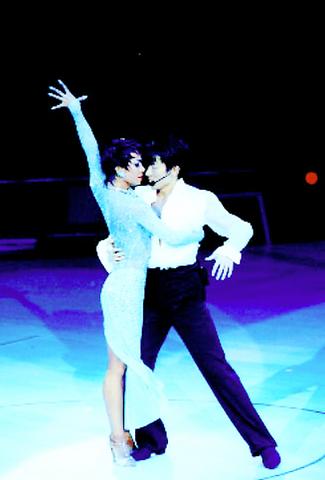He's a Hong Kong mega-star, possibly the most mega of that city's mega-stars, with a face that's recognizable even to people who don't like or listen to Mando-pop. So it comes as a surprise to many people newly arriving in Taiwan to pull up to a toilet or urinal and see Andy Lau's (
Was the sticker placed there by a dirty-minded and spiteful fan of Jacky Cheung (

PHOTO COURTESY OF UPASS
Well, so much for that angle of this story.
Anyway, tomorrow Andy will put on one of his massive, spectacular concerts in Taipei at the Chungshan Soccer Stadium, as the only stop in Taiwan on his 2002 world tour. The show is in support of his latest album, A Better Day (美麗的一天), which he promoted in Taipei last month by complaining that kids were listening too much to Jay Chou (周杰倫), in jest of course.
Andy's not about to be phased quietly out of the Mando-pop scene because a whipper-snapper like Jay is hogging the limelight. He's been around for well over a decade and has released no less than 75 albums, though a lot of these are compilations and soundtracks for his movies and TV shows. Nonetheless, he still boasts a staggering repertoire of pop songs that could potentially make tomorrow's concert extend well into Sunday afternoon. That's not going to happen, though. He'll choose the choice cuts that the entire crowd will be able to sing along to and the stadium will erupt as one enormous chorus. Don't forget your lighters and glow sticks.
Tomorrow's concert begins at 7pm. The Chungshan Soccer Stadium is located at the corner of Mintsu East Road and Chungshan North Road. To avoid traffic at the stadium take the MRT to Yuanshan Station. Tickets cost between NT$800 and NT$1,500 and are available through ERA ticketing.

President William Lai (賴清德) yesterday delivered an address marking the first anniversary of his presidency. In the speech, Lai affirmed Taiwan’s global role in technology, trade and security. He announced economic and national security initiatives, and emphasized democratic values and cross-party cooperation. The following is the full text of his speech: Yesterday, outside of Beida Elementary School in New Taipei City’s Sanxia District (三峽), there was a major traffic accident that, sadly, claimed several lives and resulted in multiple injuries. The Executive Yuan immediately formed a task force, and last night I personally visited the victims in hospital. Central government agencies and the

Australia’s ABC last week published a piece on the recall campaign. The article emphasized the divisions in Taiwanese society and blamed the recall for worsening them. It quotes a supporter of the Taiwan People’s Party (TPP) as saying “I’m 43 years old, born and raised here, and I’ve never seen the country this divided in my entire life.” Apparently, as an adult, she slept through the post-election violence in 2000 and 2004 by the Chinese Nationalist Party (KMT), the veiled coup threats by the military when Chen Shui-bian (陳水扁) became president, the 2006 Red Shirt protests against him ginned up by

As with most of northern Thailand’s Chinese Nationalist Party (KMT) settlements, the village of Arunothai was only given a Thai name once the Thai government began in the 1970s to assert control over the border region and initiate a decades-long process of political integration. The village’s original name, bestowed by its Yunnanese founders when they first settled the valley in the late 1960s, was a Chinese name, Dagudi (大谷地), which literally translates as “a place for threshing rice.” At that time, these village founders did not know how permanent their settlement would be. Most of Arunothai’s first generation were soldiers

Among Thailand’s Chinese Nationalist Party (KMT) villages, a certain rivalry exists between Arunothai, the largest of these villages, and Mae Salong, which is currently the most prosperous. Historically, the rivalry stems from a split in KMT military factions in the early 1960s, which divided command and opium territories after Chiang Kai-shek (蔣介石) cut off open support in 1961 due to international pressure (see part two, “The KMT opium lords of the Golden Triangle,” on May 20). But today this rivalry manifests as a different kind of split, with Arunothai leading a pro-China faction and Mae Salong staunchly aligned to Taiwan.